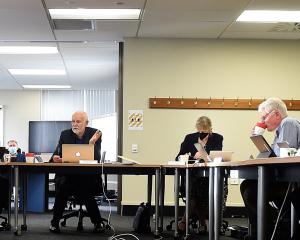The National Health Board (NHB) expects its recommendations for Dunedin Hospital will save money, but has not yet provided any estimates to back this up.
In its damning report of hospital systems released a week ago, a NHB review team made four general recommendations, plus a further 45 additional actions and outcomes.
While several of the proposed changes would require spending, when questioned on the detail, assessment team leader Jill Lane said the team believed it was obvious the potential savings would "far outweigh" the costs of implementation. Reduced hospital bed days, reduced duplications and improvements in structure and processes were predicted.
It is not known if the Southern District Health Board's executive management concurs on this issue, as it has yet to make a public statement on the report as a whole, which is being discussed at a meeting on Wednesday.
Health Minister Tony Ryall has made it clear there will be no extra money for the board to cover the recommendations, which suggests if the implementation costs are not neutral the board will have to go further into deficit. The board's projected deficit for this year is about $10.5 million.
While board staff have generally been tight-lipped about speaking out on the report, responses appear to range from those who think it is a breath of fresh air and a catalyst for much-needed change to those who say its criticisms do not apply to their area of the operation and others who see it as a highly political document.
Among the actions recommended are the development of a clinical capital expenditure programme for the next three years, something which is to be completed by December.
The board's difficulty in funding essential capital assets replacement and associated risks have been spelled out in board documents for some years, including in this year's district plan.
Questions on why successive board annual plans containing this information have been approved without a requirement these issues be sorted out were referred to the NHB by Mr Ryall's office.
Through email correspondence, Ms Lane said the NHB expected district health boards to manage the prioritisation of capital investment decisions within their available budget.
If the DHB considered it had needs which exceeded its capital budget, the NHB had a centrally led process for the prioritisation and allocation of health capital funding, she said.
She referred to the $24.38 million extra funding approved for the board last year " as part of this process", saying the board had yet to draw down this funding.
This money was for a variety of projects associated with the redevelopment of Wakari and Dunedin Hospitals, rather than routine clinical equipment replacement.
The projects did not receive preliminary design approval until February this year. Out of the 16 projects, 13 have been tendered and are under construction.
In its report, the team states it has investigated barriers to effective risk management and service improvement, but when asked if finance was considered as part of this, Ms Lane repeated Mr Ryall's expression that the board received "significant" funding and a lack of funding was not considered by the team to be a barrier.












